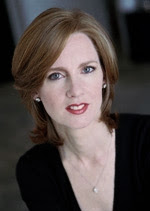 Last weekend I had the pleasure of interviewing the very happy Gretchen Rubin, a writer working on The Happiness Project — an account of the year she spent test-driving principles about how to be happy, from the wisdom of the ages to current scientific studies; from Aristotle to Ben Franklin to Martin Seligman. On her blog The Happiness Project, she reports her daily adventures on her way to becoming happier.
Last weekend I had the pleasure of interviewing the very happy Gretchen Rubin, a writer working on The Happiness Project — an account of the year she spent test-driving principles about how to be happy, from the wisdom of the ages to current scientific studies; from Aristotle to Ben Franklin to Martin Seligman. On her blog The Happiness Project, she reports her daily adventures on her way to becoming happier.
Rubin is a graduate of Yale Law School and was editor-in-chief of the Yale Law Journal. She was clerking for Justice Sandra Day O’Connor when she had the epiphany that she really wanted to be a writer.
Her bestselling Forty Ways To Look At Winston Churchill and Forty Ways To Look At JFK are succinct, provocative biographies. Power Money Fame Sex: A User’s Guide is biting social criticism in the form of a user’s manual. She also has three terrible novels safely locked in a desk drawer!
Raised in Kansas City, she lives in New York City with her husband and two young daughters. I asked her about her writing and The Happiness Project.
What prompted you to embark on The Happiness Project?
One rainy afternoon a few years ago, as I was staring out the window of a taxi, a realization jolted me so violently that I jumped in my seat. I suddenly saw that years were slipping by, and I was ignoring the great fundamentals of my life.
“What do I want?” I asked myself. “Well…I want to be happy.”
But I never thought about what made me happy, or how I might be happier, or even what it meant to be “happy.” I’d always vaguely expected to outgrow my limitations. One day, I’d magically stop twisting my hair, and wearing running shoes every day, and eating oatmeal for lunch and dinner. I’d remember my friends’ birthdays, I’d fix up our apartment, I wouldn’t let my daughter watch TV during breakfast. I’d read make more time for reading. I wouldn’t lose my temper any more, I’d spend more time laughing and having fun, I wouldn’t nag my husband, I wouldn’t be scared to drive.
I’d always vaguely expected to outgrow my limitations. One day, I’d magically stop twisting my hair, and wearing running shoes every day, and eating oatmeal for lunch and dinner. I’d remember my friends’ birthdays, I’d fix up our apartment, I wouldn’t let my daughter watch TV during breakfast. I’d read make more time for reading. I wouldn’t lose my temper any more, I’d spend more time laughing and having fun, I wouldn’t nag my husband, I wouldn’t be scared to drive.
But now, it dawned on me that I was already grown up—and I wasn’t living up to the level that I should expect of myself. If I wanted to be happier, I’d have to do some work.
“I need to think about this,” I reflected. “I should have a happiness project. Or maybe,” I thought, “I should write a book about a happiness project.” Eureka!
How would you describe yourself before starting the project?
Before I started this project, I was fairly happy and satisfied with my life. One thing that surprised me was that as soon as I started to think about how I could be happier, I realized how happy I was already. My appreciation for my life increased dramatically, once I examined it.
Have you ever been depressed?
I’ve certainly been “blue” many, many times, sometimes for quite a stretch of time, but I’ve never been clinically depressed.
In what ways have your attitudes, thoughts or beliefs changed during this project?
The key question I had when I started The Happiness Project was—does any advice actually work? Can you really make yourself happier? After all, the “set-point” theory holds that an individual’s level of happiness doesn’t fluctuate much, except very briefly. I was skeptical about the usefulness of a happiness project—but hopeful.
During the year, I tried dozens of different strategies to try to be happier. So, did it work? Did this effort actually make a difference in my relationships? Did it make any difference to my happiness?
Absolutely. I spent more time with the people I love; I made new friends; I had more fun. And apart from the direct benefit to my relationships, because I’m acting more loving, I feel more loving, and that in itself is a form of happiness.
So I’ve really become convinced that it’s possible to take steps that will make us happier.
What are your top five tips for lasting happiness?
- As basic as it is, you must get enough sleep, and you must exercise. Study after study backs up the importance of these elements to a happy life. So get out and take a walk, and turn off the light at a decent hour.
- Figure out ways to have fun. Have dinner with your friends, make time for hobbies.
- Act the way you wish you felt. If you’re feeling crabby, act loving. If you’re feeling tired, act energetic. If you’re feeling shy, act friendly. It really works!
- Get rid of things that make you feel annoyed or guilty. Make that appointment to get a skin cancer check, call your grandmother, replace a lightbulb, clean a closet, answer an old email.
- Whenever possible, connect with other people. Show up. Make plans. Join a group. Go to a party.
How important is money to happiness?
That’s a very complicated subject. But I believe that the answer, in a nutshell, is this: It depends.
- It depends on what kind of person you are. (Do you have a passion for collecting art or for renting movies?)
- It depends on how you spend your money. (Is your money buying cocaine or college?)
- It depends on how much money you have relative to the people around you, and relative to your own experience. (Are you richer or poorer than most of your friends and family? do you have more or less than you did in the past?)
In general, money does help boost happiness, though that does not mean that mere possession of a fortune guarantees happiness.
What makes you happy?
My family. My friends. Reading and writing. Positive reinforcement of all kinds—I have a real craving for achievement, praise, etc. Exercise. Living in an orderly environment.
Who has been most influential in this journey?
For reasons that are obscure to me, I have been tremendously affected by the life and writing of St. Therese of Lisieux.
How did you go from being a clerk for the U.S. Supreme Court to being an author and social critic?
 I realized that I wanted to make this switch in 1995, when I was taking a lunchtime walk around the Supreme Court in Washington. I had fabulous legal credentials—Yale Law School, editor-in-chief of the Yale Law Journal, then clerking for Justice Sandra Day O’Connor—but in an instant, staring up at the Capitol dome, I realized what I really wanted to do: I wanted to write a book about power, money, fame, and sex. It took some time, but eventually I switched careers, moved to New York City, started writing, and five years later, the book Power Money Fame Sex hit the stores.
I realized that I wanted to make this switch in 1995, when I was taking a lunchtime walk around the Supreme Court in Washington. I had fabulous legal credentials—Yale Law School, editor-in-chief of the Yale Law Journal, then clerking for Justice Sandra Day O’Connor—but in an instant, staring up at the Capitol dome, I realized what I really wanted to do: I wanted to write a book about power, money, fame, and sex. It took some time, but eventually I switched careers, moved to New York City, started writing, and five years later, the book Power Money Fame Sex hit the stores.At the time, I thought I had a tough time getting my first book published, but now that I know more, I realize that I had a very easy time of it.
I have to ask about Power Money Fame Sex: A User's Guide. First, can you give a brief outline of the book?
It is an examination of power, money, fame, and sex – what steps people can follow to get power, money, fame, and sex. I think you could describe it as Machiavellian in tone.
Now I'm curious – what does this book say about the self-help industry and about people's ability to improve themselves and their lives?
To me, this book is really an examination of human nature. I wanted systematically to explore these worldly ambitions and understand the methods by which people pursued them. I’ve always loved the self-help format, so it was fun for me to plug my analysis into that structure.
Are you saying that achievement and success equates to personal emptiness?
For some people, success is an attempt to overcome personal emptiness. For others, success is enormously gratifying and fulfilling, and acts as a helpful goad.
How far do you think people can go in changing themselves?
It’s clear that about 50% of temperament is determined by genetics. Nevertheless, I do firmly believe – and science backs me up – that while each person’s range is different, we all push ourselves up or down by the actions we take. We can make ourselves happier by doing things like exercising, helping others, and seeing friends; we can make ourselves unhappier by staying up too late night after night; isolating ourselves; brooding on feelings of anger or irritation, etc.



































